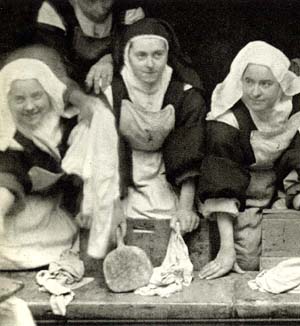Salva Nos: Perimus (Save us, we perish!)
Christ Calms the Storm
The Mass propers for today are taken from the Fourth Sunday after Epiphany. When Easter is early, these propers are moved to the weeks immediately before the end of the Liturgical year. The Gospel for today tells of the Lord calming the storm.
At that time, Jesus got into a boat, and His disciples followed Him. And behold, there arose a great storm on the sea, so that the boat was covered by the waves; but He was asleep. So they came and woke Him, saying, Lord, save us! we are perishing! But He said to them, Why are you fearful, O you of little faith? Then He arose and rebuked the wind and the sea, and there came a great calm. And the men marvelled, saying, What manner of Man is this, that even the wind and the sea obey Him? –Mt 8:23-27
If we hold the image of the storm-tossed ship in our imagination, there appears to be a tie-in between the Collect of the Mass and the Gospel. In the Collect (found in full at the end of this article), we acknowledge that we cannot subsistere. The verb comes from sisto which means “to cause to stand”, and subsistere can simply mean “stand.”
The sense in the Collect seems to be “catch our footing,” and it seems to be a reference to the condition of the storm-tossed sailors in Our Lord’s boat who could not get their feet under them. So the Collect could be translated: “O God Who knowest we are set in the midst of so many and great dangers that, in our human frailty, we are not able to catch our footing.”
A Prayer for the Stilling of the Inner Tempest
This particular prayer could be used to ask for God’s help in any difficulty in life. So often we experience ourselves storm-tossed in an invisible way. Do we not wish to cry out: Perimus! “We’re perishing”?
A Response from St. Thérèse
Writing to her sister Céline, St. Thérèse of the Child Jesus and of the Holy Face made use of this image of the storm-tossed boat, refashioning it in her own inimitable way. She first places Céline in the boat, using the images of a little child and of being alone to convey the psychological difficulties Céline found herself in.

I am not surprised that you understand nothing that is taking place in your soul. A LITTLE child all alone on the sea, in a boat lost in the midst of the stormy waves, could she know whether she is close or far from port? While her eyes still contemplate the shore which she left, she knows how far she has gone, and, seeing the land getting farther away, she cannot contain her childish joy. Oh! she says, here I am soon at the end of my journey. But the more the shore recedes, the vaster the ocean also appears. Then the little child’s KNOWLEDGE is reduced to nothing, she no longer knows where her boat is going. She does not know how to control the rudder, and the only thing she can do is abandon herself and allow her sail to flutter in the wind….
But St. Thérèse amends this. Céline is not alone.
Jesus is there, sleeping as in days gone by, in the boat of the fishermen of Galilee. He is sleeping…and Céline does not see Him, for night has fallen on the boat…. Céline does not hear the voice of Jesus. The wind is blowing…she hears it; she sees the darkness…and Jesus is always sleeping. However, if He were to awaken only for an instant, He would have only to command the wind and the sea, and there would be a great calm. The night would become brighter than the day, Céline would see the divine glance of Jesus, and her soul would be consoled….
What to do? Should Céline awaken the little Jesus now that she knows He is there? St. Thérèse suggests a different approach. If Céline did this,
Jesus, too, would no longer be sleeping, and He is so FATIGUED!… His divine feet are tired from going after sinners, and in Céline’s boat Jesus is sleeping so peacefully. The apostles had given Him a pillow. The Gospel gives us this detail. But in His dear spouse’s [Céline‘s] little boat Our Lord finds another pillow much softer, Céline’s heart. There He forgets all, He is at home…. It is not a stone which supports His divine head (that stone for which He longed during His mortal life), it is the heart of a child, the heart of a spouse. Oh, how happy Jesus is!
But a problem arises. Jesus is happily asleep, but Céline is suffering. How can this be?
But how can He be happy while His spouse is suffering, while she watches during the time He is sleeping so peacefully? Does He not know that Céline sees only the night, that His divine face remains hidden from her, and even at times the weight she feels on her heart seems heavy to her?… What a mystery! Jesus, the little child of Bethlehem whom Mary used to carry as a light burden, becomes heavy, so heavy that St. Christopher is astonished by it…. The spouse of the Canticles also says her Beloved is a bundle of myrrh and that He rests on her heart. Myrrh is suffering, and it is in this way that Jesus rests on Céline’s heart…. And nevertheless Jesus is happy[…] He is happy to receive all from her during the night…. He is awaiting the dawn and then, oh, then, what an awakening will be the awakening of Jesus!!!…
Both And?
St. Thérèse’s consolation to her sister was that Jesus is truly aware of her in the boat, resting on her heart as on a pillow. She wanted Céline to have confidence in the care of Jesus, even when that care wasn’t apparent.
Doesn’t this seem the opposite of what the Apostles did in the boat? They felt they were in danger even though Jesus was with them! The gentle rebuke that Jesus gave the Apostles in the boat seems to confirm this: “, Why are you fearful, O you of little faith?” (Matthew 8:26)
Shall we then ever remain silent and passive in the face of difficulties? Are we never to cry out: “Save us! We are perishing”?
But, in all humility, we must admit that we are often very far from this confidence and faith. We are sometimes those of little faith. It would, indeed, not be authentic to pretend to have a confidence that we do not have. Even so, we may confidently hope to receive this confidence from Jesus. Sometimes we need to wake the Lord up so that we can hear Him say: “Why are you fearful, O you of little faith?”
But perhaps there is another reason to cry out to the Lord, for this need not be an expression of lack of confidence. Did not Mary and Martha send word to the Lord, saying: “The one that Thou lovest is ill” (John 11:3)? And did not the Blessed Virgin tell the Lord of the need at the wedding: “They have no wine” (John 2:3)?
The Lord desires us to tell Him of our difficulties, and this too can be an act of confidence. We tell Him what is happening. By this we say to Him, essentially, You take care of it! We abandon it all to Him by surrendering it to Him in complete simplicity.
So whether our faith is weak, or we wish to surrender our inner storm to Jesus in confidence (or a mixture of both), let us pray that we may overcome all by His Help.
A Liturgical Prayer
What better way to entrust our needs to the Lord, then, than by using the very prayer that the Holy Spirit has put on the lips of the Church? It is a custom to take the Benedictus or Magnificat antiphon, the versicle, and the Collect, and to pray them together. Why not make this a prayer for the Lord to enter into the tempest-tossed parts of our lives to strengthen us and make us more than conquerors?
| Ant. Dómine, salva nos, * perímus: ímpera, et fac, Deus, tranquillitátem. | Ant. O Lord, save us, * we perish! Command, O God, and make there to be great calm. |
| ℣. Dirigátur, Dómine, orátio mea. ℟. Sicut incénsum in conspéctu tuo. |
℣. Let my prayer, O Lord, be set forth. ℟. As incense in Thy sight. |
| Orémus. Deus, qui nos, in tantis perículis constitútos, pro humána scis fragilitáte non posse subsístere: da nobis salútem mentis et córporis; ut ea, quæ pro peccátis nostris pátimur, te adiuvánte vincámus. Per Dóminum nostrum Iesum Christum, Fílium tuum: qui tecum vivit et regnat in unitáte Spíritus Sancti, Deus, per ómnia sǽcula sæculórum. ℟. Amen. |
Let us pray. O God, Who knowest we are set in the midst of so many and great dangers that in our human frailty we are not able to stand upright; grant to us such health of mind and body that we may overcome, as Thou dost help, all those things that, for our sins, we suffer. Through Jesus Christ, Thy Son our Lord, Who liveth and reigneth with Thee, in the unity of the Holy Ghost, God, world without end. ℟. Amen. |

